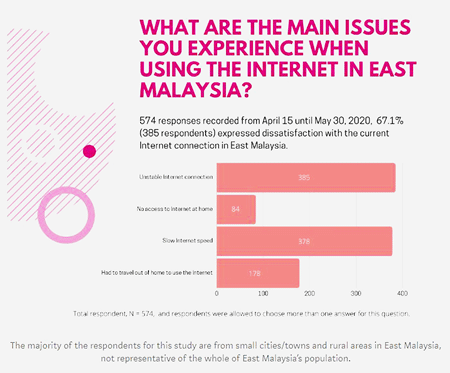
A telecommunications tower near a village in Miri where voice and Internet connection is still poor.
A STUDY has found dissatisfaction among 67.1 per cent or 385 users over Internet access in East Malaysia due to weak, slow, and unstable connectivity – with some being unable to log in at all.
Assistant Professor of Communication at Northern State University in Aberdeen, South Dakota, Dr Nuurrianti Jalli said the study was recorded from April 15 to May 30 this year, involving a total of 574 respondents.
According to her, 63.1 per cent of the respondents were from Sarawak and 36.9 per cent from Sabah, with most living in small towns (50 per cent), rural areas (32.9 per cent), and large cities (17.1 per cent).

Dr Nuurrianti Jalli
“Thirty-one per cent or 178 respondents from rural Sarawak and Sabah reported they had to leave home to look for stable Internet access while 14.6 per cent or 84 respondents said they had no Internet access at home.
“The data were derived mostly from urban and rural respondents, who do not represent the whole populations of Sarawak and Sabah. Only a small number from the major cities were involved. Further studies can focus on city dwellers,” she said.
Nuurrianti, from Miri, added that her study also found 51.9 per cent or 297 respondents had reported the problem to the elected representatives or Internet service providers.
Another 50.3 per cent or 289 respondents said the problem is ongoing and no effective remedial action had been taken so far.
Lack of support
Besides the questionnaires, Nuurrianti conducted in-depth interviews with 20 respondents, including teachers, parents, and students.

One of the places rural students have to go to have Internet access for online learning.
“I found some of the key issues brought up concerned business monopolies by government-linked Internet service providers, weak connectivity to mobile networks by local telecommunications companies, lack of support from the YBs (elected representatives) to raise the issues and slow telecommunications development despite plans to bridge the digital gap.
“Students interviewed argued Internet access interruptions caused teachers to send their work via WhatsApp without any active teaching and learning sessions. Even if teachers ran online classes on platforms like Google Classroom, students will still have persistent (Internet) problems,” she said.

The 1Malaysia Wireless Village signboard at a village in Miri.
Nuurrianti added that to have stable Internet connectivity for studies, students had to leave home for a place with better online service.
She said with the poor Internet access in the rural areas of Sarawak and Sabah, it would have been impossible for teachers and students to conduct online learning while the country was battling the Covid-19 pandemic.
“The YBs need to be more assertive and courageous in fighting for the rights of their constituents to access Internet of Things (IoT),” she said.
Nuurrianti also said 44.8 per cent or 257 out of a total of 574 respondents felt they lacked the support of the YBs in speeding up telecommunications development in East Malaysia.
“My suggestion is that the YBs should be the voice of the people, especially to those Internet service providers who do not want to be at a place they claim as unprofitable.”

A disappointment
Nuurrianti, who is also former research fellow of the UITM Centre for Media and Information Warfare Studies noted despite the campaign to set up a wireless village under the 1Malaysia initiative, much left to be desired.
“Internet access remains a problem for many people in Sarawak and Sabah, even for those living in the wireless village.
“This is a wakeup call for the YBs to look into the issue in their constituencies and find way to resolve them.”
Her study also found 74.4 per cent or 407 respondents felt the region’s largest broadband provider is monopolising the Internet service industry, leaving consumers with little or no choice.
“While many have opted to subscribe to mobile Internet services through telco companies, those interviewed said they had complained about Internet connection issues to the service providers but to no avail.
 “Sarawak and Sabah still depend on the broadband service of the leading companies because, in both states, the choice of fixed line broadband service companies is very limited.
“Sarawak and Sabah still depend on the broadband service of the leading companies because, in both states, the choice of fixed line broadband service companies is very limited.
“The fixed broadband Internet service, offered by the company, is also considered more reliable than the mobile Internet service provided by the mobile telecommunications company,” she said.
Nuurrianti added that the Sarawak government through the Sarawak Multimedia Authority (SMA) had announced the SMART 300 project under the Sarawak Digital Economic Plan to bridge the digital divide through 300 new telecommunication towers statewide by the end of 2021.
“My hope is this project will meet the timeline set for completion. Internet service centres can also be expanded in areas with limited Internet access as a short-term solution,” she suggested.
